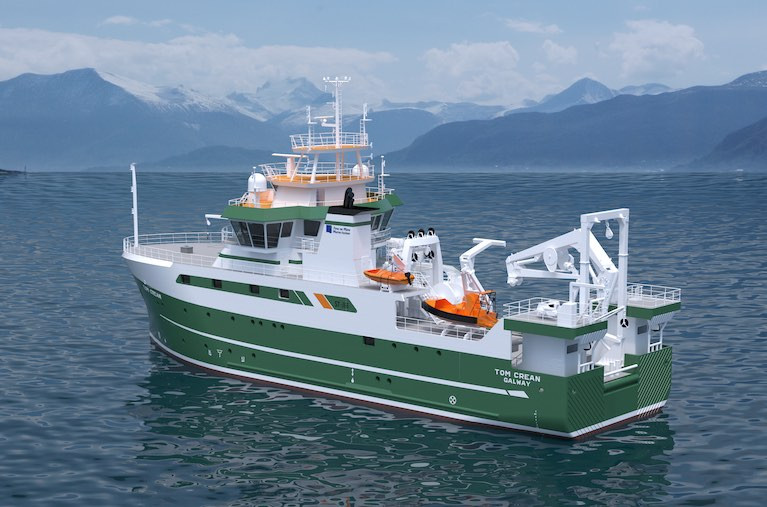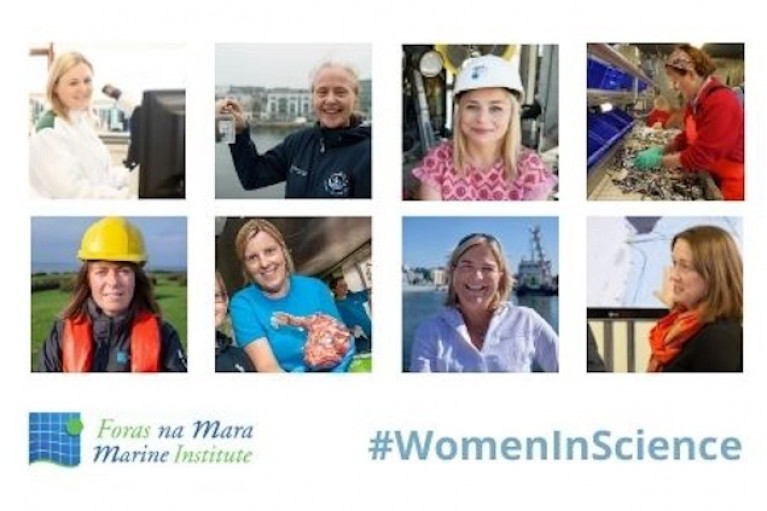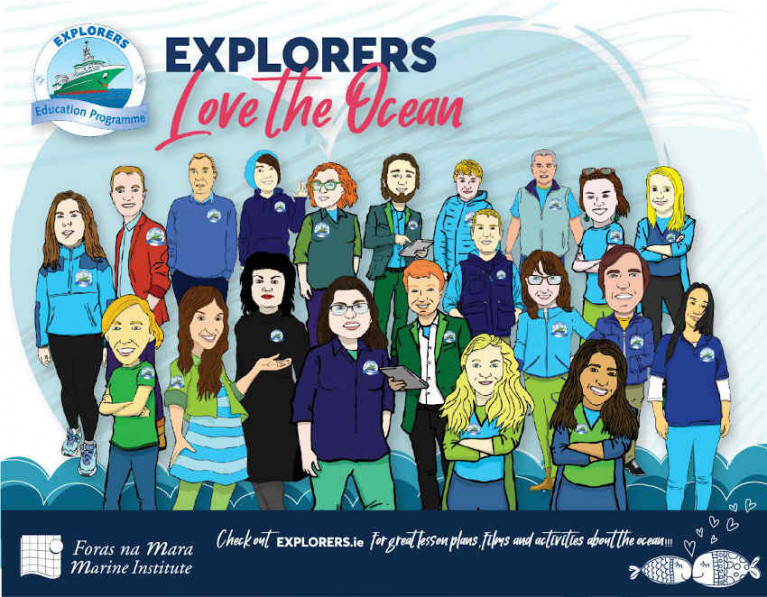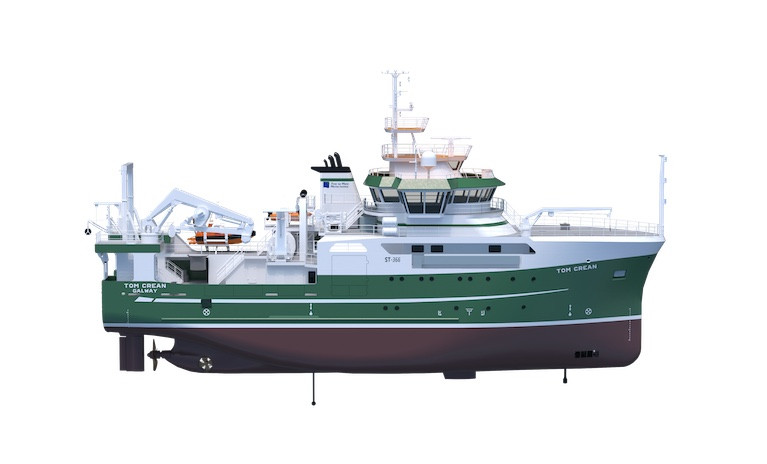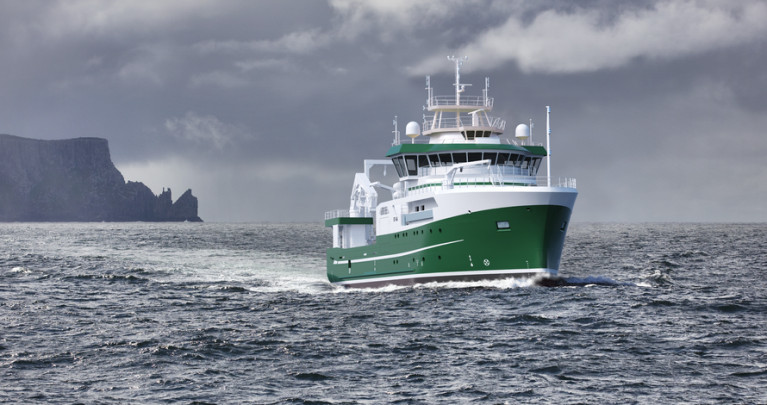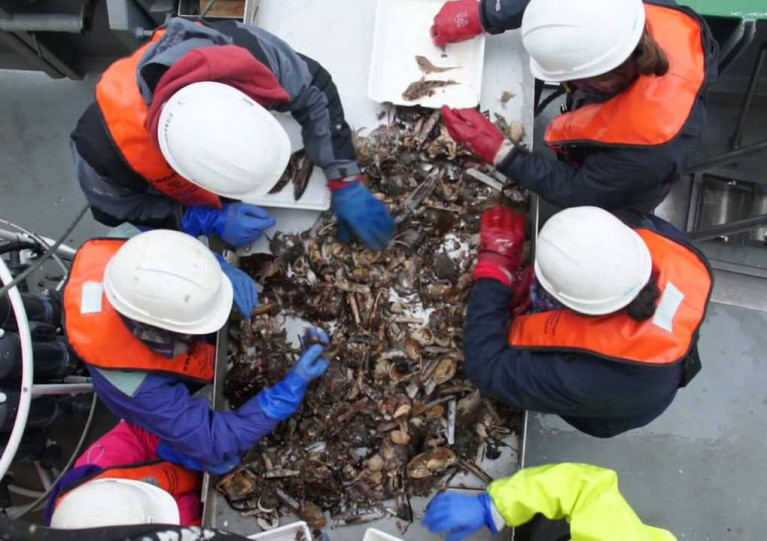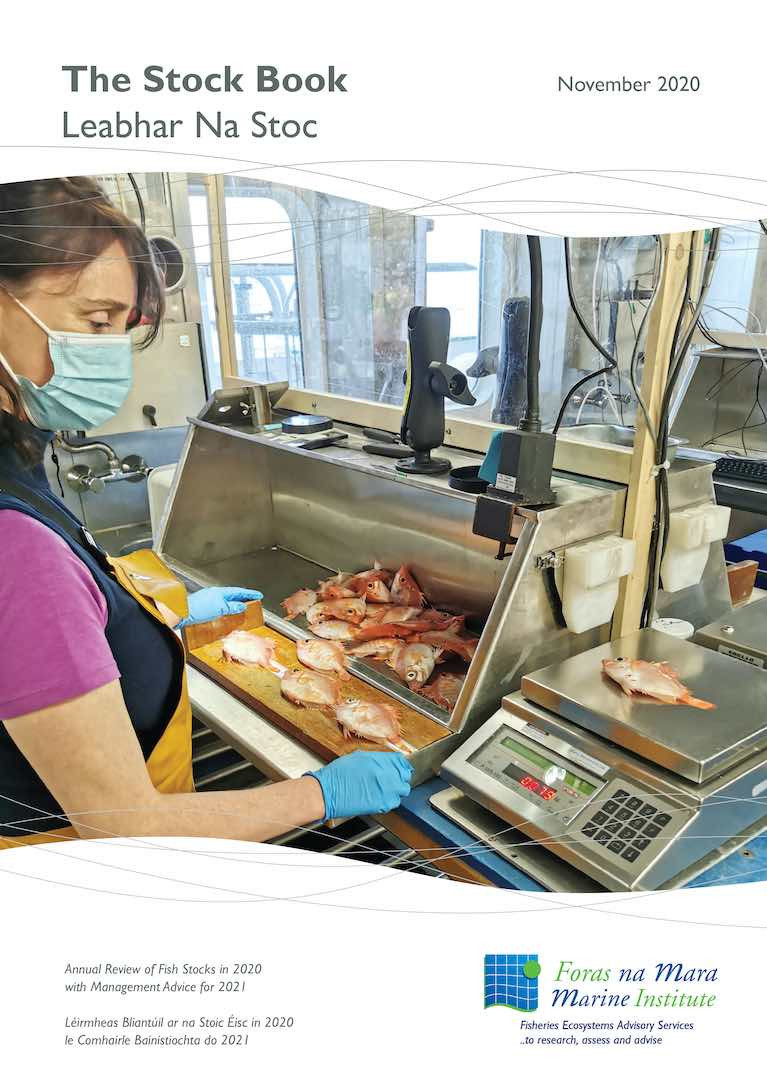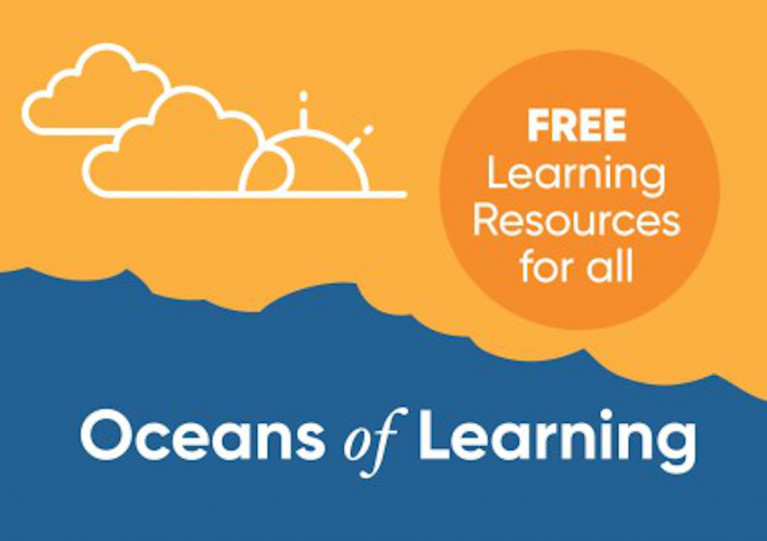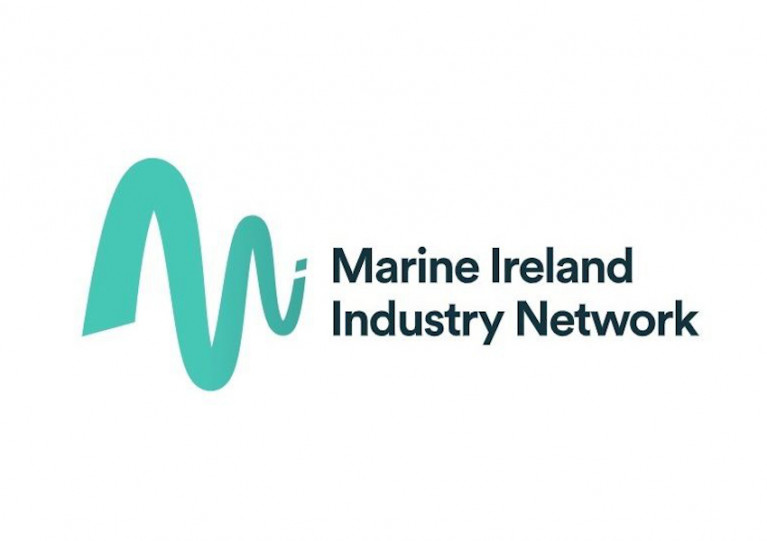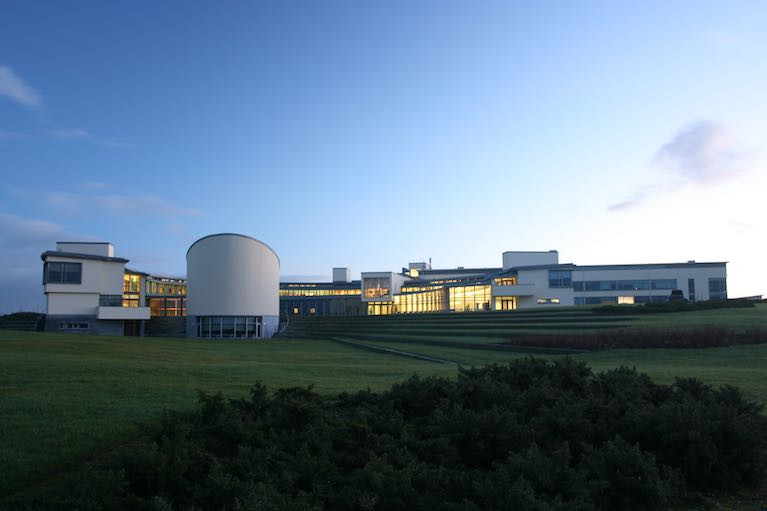Displaying items by tag: Marine Institute
As Afloat first highlighted the Marine Institute's name of RV Tom Crean chosen for the new €25m research vessel due for delivery in Autumn 2022, is to feature a suite of the latest state of the art technology equipment, writes Jehan Ashmore.
RV Tom Crean of 52.8m will be one of world's most advanced research vessels is to directly replace the smaller RV Celtic Voyager of 31.40m and of 23 years service having operated duties in more inshore waters.
While the larger fleetmate, RV Celtic Explorer of 65.5m dating to 2003 will be joined by the newbuild to carry out an extensive capability of marine research activities. They include vital fisheries data (incl. EU Common Fisheries Policy), Irish seabed mapping (INFOMAR) and oceanography and critical climate change related research given this year marks the start of the UN Decade of the Ocean (2021-2030) and its urgency.
The newbuild was commissioned by the Department of Agriculture, Food and the Marine with the approval of the Government of Ireland, to enable the State's national integrated marine plan, 'Harnessing Our Ocean Wealth' and the national Marine Research and Innovation Strategy.
Afloat can also reveal that RV Tom Crean will be around 1,900 gross registered tonnes, with the first block laid down on 4th November last year at the Spanish shipyard of Astilleros Armon Vigo S.A. So far, 19 out of 32 block sections constructed are in place, with September 2021 scheduled for starting a 'fitting-out' period of the semi-completed newbuild prior to the newbuild's commissioning around a year later.
The shipyard is working to a design of Norwegian naval architects, Skipsteknisk AS based in Ålesund which was awarded the work following a EU tender process. The design consultancy were also responsible for the RV Celtic Explorer which will be joined by RV Tom Crean in the M.I.'s homeport of Galway, strategically located on the western seaboard and with easy access to the North Atlantic Ocean.
Afloat contacted the Marine Institute since (their press release), for further details of the RV Tom Crean characteristics, in particular the all important aft work deck, where the primary action is to take place in water operations in depths down to 4,000m.
According to Aodhán FitzGerald, Research Vessel Manager of the MI, the RV Tom Crean will feature an articulated boom crane aft (6t@ 10m, 3T@ 15m), located on the aft-gantry. This will be largely used for loading science equipment and net and equipment handling offshore.
Mounted at the stern is a 10T A frame aft which can articulate through 170 degrees which is for deploying and recovering large science equipment such as remotely operated vehicle (ROV’s), towed sleds and for fishing operations.
The vessel also has a heave compensated CTD system (system for measuring water temperature, salinity and depth and for collecting water samples) consisting of a deepwater winch and Frame to allow CTD operations in water depths down to 4000m.
Part of the equippment will be a regulation MOB boat on a dedicated davit and the facility to carry a 6.5m Rigid Inflatable tender on the port side.
Also at the aft deck is where the 'Holland 1' Work class ROV and the University of Limericks 'Etain' sub Atlantic ROV will be positioned. In addition up to 3 x 20’ (TEU) containers can be carried.
The newbuild has been engineered to endure increasing harsher conditions and the punishing weather systems encountered in the North-East Atlantic where deployments of RV Tom Crean on surveys spent up to 21 days duration.
In addition, RV Tom Crean will be able to operate in an ultra silent-mode, which is crucial to meet the stringent criteria of the ICES 209 noise standard for fisheries research purposes.
Of course all this broad-tasking can only be achieved with a team combining 12 crew and 14 scientists accommodated in the research vessel with associated laboratory facilities. In addition there will also be an on board hospital.
Marine Institute Celebrates Women in Science
The Marine Institute is celebrating the International Day of Women and Girls in Science on 11th February 2021, by highlighting the many brilliant women who play transformative and ambitious roles in understanding, exploring, protecting and sustainably managing the wealth of our oceans.
"The Marine Institute recognises our people as a critical enabler of success, and we are committed to supporting a diverse workforce and a culture of high performance driven by our people. Just as the ocean supports a great diversity of life and ecosystems, the Marine Institute values our diverse workforce," said Patricia Orme, Director of Corporate Services at the Marine Institute.
The Marine Institute has a staff of 234 employees, and supports a strong workforce of female employees at 51%. The organisation continues to recognise that its employees’ skills, experience, diversity and passion for the marine are central to the work that is undertaken for the government and other partners.
"Almost 70% of the women working at the Marine Institute work in roles that deliver key services centred around science, technical analysis and research including areas of oceanography & ocean climate, fisheries ecosystems and advisory roles, marine environment and food safety and the development of applications. We also have women working in policy, innovation and research, maritime development and corporate roles. We are extremely proud to note that 80% of our female employees hold bachelor, masters or doctorate level qualifications," Patricia Orme added.
From the 8th – 12th February 2021, the Marine Institute will share photos, animations and profiles of female scientists, sharing their study and career paths, the work they do at the Marine Institute and the important contribution their work delivers. Follow #WomenInScience on the Marine Institute’s Facebook, Twitter and Instagram to meet some of our female scientists, learn about their work and their many successes.
The International Day of Women and Girls in Science Forum has been one of the flagship events of the United Nations, since its inception in 2016. It is a key event for women and girls in science, science experts, policy-makers and diplomats to share their vision, expertise and best practices to achieve internationally agreed development goals, including the 2030 Agenda for Sustainable Development. According to data from the UN Scientific Education and Cultural Organization (UNESCO), 30% of researchers worldwide are women and approximately 35% of all students in STEM-related fields in higher education are women.
Explorers Education Programme Launches ‘We Love the Ocean’ Facts to Inspire Fun Activities at Home
The Marine Institute’s Explorers Education Programme team are getting ready for the season of love by launching a series of fascinating facts about the ocean.
“Making personal connections and hearing stories about what we love to do at home and why we also love the ocean is a great way to help us all increase awareness of the ocean and inspire new conversations about why the ocean is important to us,” said Cushla Dromgool-Regan, Explorers Education manager.
“With these fun facts, we hope to inspire parents, teachers and children to think more about how the ocean impacts their lives and how they impact the ocean – sometimes indirectly through their day-to-day activities at home and at school.
“Throughout February, we would love to hear about these ocean love connections posted on our social media sites or shared with us by email #LovetheOcean.”
Adding a personal touch to the 28 ‘We Love the Ocean’ facts, Dromgool-Regan adds, the team around Ireland are sharing what they love to do and connecting these activities with some of the amazing facts about the ocean.
The facts and connections also provide useful ideas for teachers and parents to link the ocean to subjects that are covered on the primary school curriculum.
If you would like to see more of the Explorers’ Love the Ocean facts for ideas to develop activities at home or in class, follow the Explorers Education Programe on Facebook and Twitter.
Ireland’s New Marine Research Vessel to Honour Irish Explorer Tom Crean
Ireland’s new marine research vessel will be named the RV Tom Crean. Due to be completed in summer 2022, the new state-of-the-art multi-purpose marine research vessel will carry out a wide range of marine research activities, including vital fisheries, climate change-related research, seabed mapping and oceanography.
The new 52.8-metre modern research vessel, which will replace the 31 metre RV Celtic Voyager, has been commissioned with funding provided by the Department of Agriculture, Food and the Marine approved by the Government of Ireland.
As Afloat's Jehan Ashmore reported at the weekend, Ireland’s new marine research vessel will be named the RV Tom Crean, after the renowned seaman and explorer who undertook three major groundbreaking expeditions to the Antarctic in the early years of the 20th Century which sought to increase scientific knowledge and to explore unreached areas of the world, at that time.
 An illustration of Ireland’s new marine research vessel, RV Tom Crean, produced by Norwegian architects Skipsteknisk AS
An illustration of Ireland’s new marine research vessel, RV Tom Crean, produced by Norwegian architects Skipsteknisk AS
Minister for Agriculture, Food and the Marine, Charlie McConalogue T.D. said, “I am delighted to announce the name of Ireland’s new marine research vessel is the ‘RV Tom Crean’, acknowledging the contribution of a legendary Irish Explorer. The new vessel will enable Ireland to undertake critical research work which will support many of the projects outlined in the Programme for Government including fisheries assessment, offshore renewable energy, marine spatial planning, marine protected areas and addressing the challenges of climate change.”
The new marine research vessel will provide year-round service for expanded fisheries surveys, seabed mapping, deep water surveys and support increased research in the Atlantic Ocean. The new vessel will enable 300 operational days at sea each year, and up to 3000 scientist days per year. The new vessel will also enable the Marine Institute to continue to lead and support scientific, high-quality surveys that contribute to Ireland’s position as a leader in marine science.
A native of Annascaul in Co Kerry, Crean volunteered for Robert Falcon Scott’s Discovery expedition in 1901 and for his Terra Nova expedition in 1910. During the Terra Nova expedition, Crean made an 18-hour solo journey in desperate conditions to save the life of a fellow crew member and was awarded the Albert Medal for his acts of heroism. In 1914, he joined Ernest Shackleton on the Endurance expedition and, again, he proved himself to be a much-trusted crew member and someone capable of great endurance and heroism.
Dr Paul Connolly, CEO of the Marine Institute said, “The decision to name Ireland’s new research vessel after Tom Crean honours his achievements and gives due recognition to an Irish explorer of international renown. The Institute greatly appreciates the support of the descendants of Tom Crean in this decision. This naming decision also reflects the values of the Marine Institute, the collaborative efforts and achievements of its staff, particularly the service provided by all staff who go to sea.”
Speaking on the announcement today, grand-daughter of Tom Crean, Aileen Crean O’Brien, on behalf of the family, said: “We welcome the decision by the Irish government and the Marine Institute to name their new marine research vessel after Tom Crean, of whom we as a family are very proud.”
Dr Connolly continued, “This new multi-purpose research vessel, the RV Tom Crean will greatly enhance Ireland’s capacity to undertake collaborative research and acquire the data and knowledge essential to managing our marine resources.”
The two Marine Institute research vessels currently in operation, the RV Celtic Explorer and RV Celtic Voyager, are among the most intensively used research vessels in the world.
The new vessel will replace the RV Celtic Voyager, which was Ireland’s first purpose-built research vessel and was commissioned in 1997. It has been vital in providing marine scientists, researchers and its crew members with many years of valued experience at sea, expanding and strengthening marine science in Ireland to help inform decisions affecting our oceans. It was joined by its 65-metre sister RV Celtic Explorer in 2003.
The construction of the new national research vessel continues on schedule in 2021 at a total build cost of €25 million, with the build process expected to be completed by summer 2022. Spanish shipyard Astilleros Armon Vigo S.A. was awarded the contract to build Ireland’s new state-of-the-art marine research vessel in 2019, following the completion of the design by Norwegian ship design consultants Skipsteknisk AS.
The new research vessel will be a modern, multipurpose, silent vessel, capable of operating in the Irish Exclusive Economic Zone (EEZ). The new vessel will be able to go to sea for at least 21 days at a time and will be designed to operate in harsh sea conditions. Based in Galway, the vessel will be used by the Marine Institute, other state agencies and universities to undertake fisheries research, oceanographic and environmental research, seabed mapping and other multidisciplinary surveys. It will also maintain and deploy weather buoys, observational infrastructure and our Remotely Operated Vehicle (ROV) Holland I.
It will be designed to incorporate the latest proven technologies to ensure that it operates as efficiently as possible, ensuring minimal fuel consumption and minimising the vessel’s environmental impact and carbon footprint.
New Research Vessel for Marine Institute to be Named RV Tom Crean - Afloat Reveals
A Norwegian naval architect consultancy that has designed the Marine Institute's new research vessel, Afloat.ie reveals is to be named RV Tom Crean after the Irish seaman and polar explorer in Antarctica, writes Jehan Ashmore.
The name chosen for the 52.80m marine research vessel by the M.I. will honour and recognise the famous Co. Kerry born native from Annascaul who was a member of three major expeditions to Antarctica that took place more than century ago. To read more of these considerable achievements they can be read here.
Also the news of the vessel's name breaks away from the M.I's traditional naming nomenclature using the prefix 'Celtic' as used by a pair of existing research vessels.
As Afloat previously reported, €25m has been allocated in the 2021 budget to progress the construction of the vessel which will form a critical part of the Irish State’s maritime infrastructure, and the strategic importance positioned on the edge of the Atlantic Ocean.
 RV Tom Crean: A screenshot from the website of the Norwegian naval architect consultancy, Skipsteknisk AS
RV Tom Crean: A screenshot from the website of the Norwegian naval architect consultancy, Skipsteknisk AS
RV Tom Crean is to replace the 23 year old RV Celtic Voyager with the newbuild scheduled to be completed in 2022 and be based in Galway Harbour where the port comprises a dock basin. Also in Co. Galway on the outskirts of the mid-west city, is where the Marine Institute has its headquarters based in Oranmore.
Minister for the Marine, Charlie McConalogue commented that the modern research vessel will enable Ireland to address considerable challenges faced by Brexit and the Common Fisheries Policy and climate-induced impacts on our oceans. The research ship will be able to operate in rougher seas and have the use of technology with 'green' credentials. Surveys will be up to 21 days duration and exploration depths down to 3,000m.
The newbuild designated as ST-366 by designers, Skipsteknisk AS based in Ålesund in western Norway, were awarded the work following a EU tender process. The above GCI image visual of the modern yet elegant appearance of RV Tom Crean arises from Afloat consulting the naval designer website, which displays other newbuild projects from the company founded in 1976. Norway, which is rich in fishing grounds has not surprisingly seen Skipsteknisk develop over the decades in designing ice-strengthened factory trawlers as a speciality.
As also to be seen in the image, the newbuild RV Tom Crean continues to retain the M.I. colours of a green hull and white superstructure of the current Galway based reseach vessel pair, Celtic Voyager and Celtic Explorer.
As for the accommodation of the RV Tom Crean this will provide for 12 crew and up to 14 scientists. In addition an on board hospital.
The classification of the newbuild as been appointed to Lloyds and below is a list of the main capabilies and duties to be tasked by RV Tom Crean:
⦁ Oceanographic surveys, incl. CTD water sampling
⦁ Fishery research operations
⦁ Acoustic research operations
⦁ Environmental research and sampling operation incl. coring
⦁ ROV and AUV/ASV Surveys
⦁ Buoy/Mooring operations
It is more than a year since the Marine Institute announced the ship's order in December 2019. The new research vessel which is to replace the older 31.40m RV Celtic Voyager (1997) while the larger 65.50m RV Celtic Explorer (2003) remains in service complete with the 'Holland I' deep-water ROV. It should be noted as part of this ship's equipment is a tender craft called Tom Crean.
Both of these M.I research vessels were custom built, with the Celtic Voyager from the Netherlands from where outfitting took place for the Celtic Explorer having been built in Romania.
This time the order for RV Tom Crean was contracted to the Spanish shipyard of Astilleros Armon Vigo S.A. The north-western Iberian yard is to build Ireland’s new state-of-the-art marine research vessel, which marks a significant milestone with the construction process expected to be completed next year.
In addition to RV Tom Crean's role mentioned above, the newbuild will also be supporting the Government’s national integrated marine plan, Harnessing Our Ocean Wealth, and the national Marine Research and Innovation Strategy.
Asides the Marine Institute headquarters, Galway is also home to P&O Maritime Services which over the years, provides the M.I. research vessels with crewing along with shore staff based in the coastal city.
Up to 20 Bursaries Offered in Marine Institute & SMART Research Vessel Call for 2021
The call is now open for Marine Institute SMART Research Vessel Bursaries 2021 — but applicants must act fast, as the closing date for the first survey is this coming Tuesday 2 February.
This year up to 20 bursaries are being offered on dedicated FEAS surveys, where successful applicants for the Student at Sea Bursary (fixed at €95 per survey night) will be mentored by experienced marine scientists and research leaders as they develop core offshore data collection skills.
As with last year’s bursaries call, applicants should be marine-oriented graduates, postgraduates, researchers or practitioners in marine-oriented enterprises.
Surveys with bursaries include the second and third legs of the Irish Anglerfish and Megrim Survey (20 February-4 March and 10-24 April respectively), Western Edge Small Pelagics Acoustic Survey (9 June-20 July), Celtic Sea Herring Acoustic Survey (8-28 October) and Irish Groundfish Survey (29 October-14 December).
To read more about these opportunities, including how to apply please, see the SMART website HERE.
Marine Institute’s 2020 Stock Book Assesses 74 Key Fish Stocks
The Marine Institute’s 2020 Stock Book is now available online and via an interactive online application. Every year the Marine Institute produces an overview of scientific assessments and advice on 74 key fish stocks of interest to Ireland. The Stock Book is one of the principal annual publications of the Marine Institute, informing the Minister for Agriculture, Food and the Marine prior to the annual Fisheries Council negotiations. The Stock Book also serves as a valuable reference guide to a wide audience, including the fishing industry, managers, marine scientists, environmental NGOs, third level institutes and financial institutions.
The Stock Book, has been published by the Marine Institute since 1993 and in the last few years, the publication has also been accessible via an online application. The app allows users to quickly access the latest and historic scientific advice on most devices with a web browser. Interactive features such forecast graphs showing the consequences of following the scientific advice or choosing other scenarios in terms of catch for 2021 and future stock size in 2022.
The Stock Book integrates scientific advice from the International Council for the Exploration of the Seas (ICES) with relevant information on Irish fisheries. Marine Institute scientists participate in, and lead, many international working groups at ICES.
Dr Ciaran Kelly, Director of Fisheries Ecosystem Advisory Services at the Marine Institute said, “The interactive app developed by the Marine Institute is shaping thinking on how independent scientific advice can be delivered to fisheries managers and other stakeholders in the future. Ensuring that the best available scientific evidence for decision making is easy to access and transparent to all.”
The scientific advice and services provided by scientists to the Department of Agriculture, Food and the Marine, is a key focus of the Marine Institute’s Strategic Plan 2018-2022. “These scientific services are essential to supporting our sustainable ocean economy, protecting and managing our marine ecosystems and meeting EU obligations” said Dr Paul Connolly, CEO of the Marine Institute.
The Stock Book forms an important component of the sustainability impact assessment presented to the Oireachtas Joint Committee on Agriculture, Food and the Marine annually before the EU fisheries negotiations commence. There has been gradual increase in the number of stocks that are sustainably fished in line with Common Fisheries Policy objectives in the last decade. The two most valuable species for Irish fishermen, mackerel and many of the Nephrops (Dublin Bay Prawns) stocks, are sustainably fished. However, there are also a number of cod, herring and whiting stocks that continue to remain at low levels despite management measures aiming to rebuild them.
The 2020 Stock Book is available electronically on the Marine Institute’s website and as an interactive app. Most of the scientific work that delivers the Marine Institute’s Stock Book is funded under the European Maritime Fisheries Fund scheme.
Oceans of Online Learning Resources For Home-Schooling Families
Families schooling their children at home during the January lockdown can find a wealth of free online activities and resources from the Marine Institute’s Oceans of Learning series.
According to Marine Institute chief executive Dr Paul Connolly, the series “highlights how the ocean has an impact on our lives every day — from providing food, transport and employment to the influence it has on our climate and weather, as well as our health and wellbeing”.
He adds: “In a challenging time, our online learning resources make it easier for those of all ages to learn about our ocean from home.”
The latest additions to the Oceans of Learning lineup comprise a deep dive on Ireland’s research vessels, including a virtual tour of the RV Celtic Explorer; exploring beneath the waves at the SmartBay Observatory; and learning how the Irish Marine Data Buoy Observation Network is crucial to our understanding of weather.
They add to a packed series of modules last summer, taking in everything from Ireland’s coastal communities to the shipping sector, the changing ocean climate, health and wellbeing, collaboration and sustainability.
A highlight was the exclusive Irish interview with Kathy Sullivan — the first person to ever experience travelling to both deep space and the oceans deep.
These are bolstered by additional resources on the RTÉ Learn website, including the documentary series Ireland’s Deep Atlantic which features on the Junior Cert curriculum.
The Marine Ireland Industry Network (MIIN) is expanding its social media presence as it prepares for the official launch of its brand-new website.
Established in 2016 with the aim of bringing together Ireland’s marine industry under the ‘Marine Ireland’ brand, the network comprises a diverse range of companies, State organisations, research groups and academia working in Ireland’s blue economy.
At the heart of the MIIN are the Marine Institute, Enterprise Ireland and BlueWise Marine — the former SmartBay Ireland based in Galway.
The network’s new website, which includes a member’s directory, is now live and among other things is intended to be a one-stop shop for international interests to better understand the capabilities of the marine industry here.
The MIIN says it is “focused on building collaboration and promotion opportunities for its members, both nationally and internationally”.
The new website is now live and will be officially launching soon. For updates on this launch event and more follow @MarineIrnNet on Twitter.
Minister Invites Applicants for Board of the Marine Institute
The Minister for Agriculture, Food and the Marine invites applications from suitably qualified candidates to fill four vacancies on the board of the Marine Institute.
Candidates must have demonstrable experience relevant to the work of the Institute in one or more of the following areas.
- Seafood/Sea Fisheries Sector
Given the strategic significance of the seafood sector, the complexity of the issues, opportunities it presents and the critical role of the MI in relation to this priority, at least one of the successful candidates should have demonstrable experience of having worked at an appropriately senior level in the seafood or wider food sectors and or the sea fisheries sector specifically. - Climate Impacts and Mitigation
The Marine Institute's Strategic Plan has a strong focus on Climate Change. One or more of the successful candidates should have demonstrable knowledge of Ocean Climate issues including mitigation/adaptation and research priorities in this area. - Ocean Energy and/or Marine Technology
The successful candidate(s) should demonstrate a strong demonstrable working knowledge at an appropriately senior level of policy and developments in the ocean energy and or marine technology sectors with particular emphasis on experience or knowledge of the sectors within an Irish context. - Marine Research and Development
The successful candidate(s) should have clearly demonstrated national & international research experience in the marine area. In addition, they should have experience in managing research programmes and a proven knowledge of research policy and the funding environment in the area of the marine science, both nationally and internationally. - Desirable:
• Previous Board Membership
• Corporate Governance & Compliance.
• Risk Management, Strategic Planning and Implementation
• Executive/Managerial/Professional Experience of relevance to the MI
• Strong marine sectoral knowledge
• Economic knowledge/expertise relevant to the Irish ocean economy
• Financial (Accountancy, Audit, Corporate Finance)
Closing Date: 15:00 on Friday 29th of January 2021
For more information see here


























